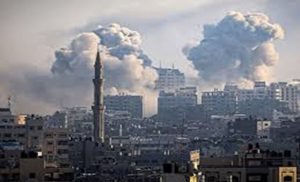“Ongoing Israel-Hamas Conflict: Further Airstrikes in Gaza Today Amid Aid Delays in Egypt; Israeli Troops on Standby for Possible Invasion”

“Ongoing Israel-Hamas Conflict: Further Airstrikes in Gaza Today Amid Aid Delays in Egypt; Israeli Troops on Standby for Possible Invasion”
In a crucial move, Joe Biden has made a resolute commitment to end the relentless bombardment plaguing the region encompassing the Rafah border with Egypt and the beleaguered Gaza Strip. The primary objective of this commitment is to pave the way for the unimpeded flow of essential humanitarian aid into this long-suffering enclave. This promise comes at a critical juncture, as Israel had previously imposed a comprehensive blockade on October 7th, effectively cutting off Gaza from much-needed assistance.
However, despite this commendable commitment, uncertainty looms over the exact timeline for reopening the border. The people of Gaza, already grappling with severe hardships, found themselves facing an unexpected threat, as Israeli missiles continued to rain down on the two million inhabitants. This situation underscores the urgent need for immediate action to alleviate the dire conditions in Gaza.
The gravity of the situation became even more apparent on a fateful Wednesday when a harrowing attack struck a residential building in close proximity to the Al-Quds hospital within the city of Gaza. This horrifying incident compelled medical personnel and innocent civilians to seek refuge and safety amid the chaos and destruction.
Joe Biden’s pledge to halt the bombardment and facilitate humanitarian assistance in this tumultuous region demonstrates a glimmer of hope in a complex and fraught situation. The uncertainty surrounding the border’s reopening, combined with the ongoing missile threats, highlights the pressing need for swift, coordinated international efforts to ensure the safety and well-being of the people of Gaza. As the situation continues to evolve, it remains imperative to keep a watchful eye on developments and strive for lasting peace and stability in the region.
As of Thursday, the situation in the Gaza Strip is deeply concerning. According to health officials in Gaza, around 3,800 people have tragically lost their lives, and another 12,500 have been wounded due to Israeli strikes. It’s heart-wrenching to note that the majority of those affected are women and children, underscoring the devastating impact of the conflict. This figure also includes more than 470 individuals who are reported to have perished in the hospital explosion, an incident that remains a subject of dispute with Israel denying involvement.
Conversely, Israeli officials report that approximately 1,400 people have been killed, and 3,500 others have been injured in the conflict, primarily as a result of attacks by Hamas.
The toll on human lives on both sides is undeniably distressing, highlighting the urgent need for a peaceful resolution to this long-standing and deeply entrenched conflict. It’s a stark reminder of the far-reaching consequences of the ongoing hostilities, with innocent civilians, particularly women and children, bearing the brunt of this tragic situation. International efforts and diplomacy remain crucial in striving for a just and lasting peace that can spare further loss of life and suffering.
give me some important question and answers for this topic”Ongoing Israel-Hamas Conflict: Further Airstrikes in Gaza Today Amid Aid Delays in Egypt; Israeli Troops on Standby for Possible Invasion”
Q1: What triggered the recent airstrikes in Gaza, and what is the current situation in the Israel-Hamas conflict? A1: The recent airstrikes in Gaza are part of the ongoing conflict between Israel and Hamas. The specific triggers for the latest escalation may involve a combination of historical tensions, political disputes, and security concerns.
Q2: Why are there aid delays in Egypt amid the Israel-Hamas conflict, and how is it affecting the situation on the ground? A2: Aid delays in Egypt during the Israel-Hamas conflict could be influenced by logistical challenges, political considerations, or security concerns. Delays may impact the humanitarian situation on the ground, affecting those in need.
Q3: Are there diplomatic efforts or international initiatives underway to address the Israel-Hamas conflict and facilitate a ceasefire? A3: Diplomatic efforts and international initiatives are typically ongoing to address the Israel-Hamas conflict. Various countries and organizations may be involved in mediating or calling for a ceasefire to de-escalate tensions.
Q4: Why are Israeli troops on standby for a possible invasion, and what are the potential implications of such a move? A4: Israeli troops being on standby for a possible invasion suggests a readiness to escalate military operations. The decision may be influenced by security concerns, the perceived threat from Hamas, or strategic considerations. The potential implications include increased hostilities and a higher risk of casualties.
Q5: How are neighboring countries and the international community responding to the recent developments in the Israel-Hamas conflict? A5: Responses from neighboring countries and the international community to the Israel-Hamas conflict can vary. Some countries may express concern, call for restraint, or actively engage in diplomatic efforts to address the situation.
Q6: What role does the United Nations play in addressing the Israel-Hamas conflict, and has there been any recent UN action or statement on the matter? A6: The United Nations typically plays a role in addressing conflicts, including the Israel-Hamas situation. Recent UN actions or statements can include calls for de-escalation, humanitarian assistance, or diplomatic initiatives.
Q7: How are civilians in the affected areas, particularly Gaza, being impacted by the ongoing conflict, and what humanitarian challenges are arising? A7: Civilians in the affected areas, especially Gaza, often face significant challenges during conflicts. These challenges may include displacement, limited access to basic services, and risks to safety. Humanitarian organizations may be working to address these issues.
Q8: What is the stance of major global powers, such as the United States, Russia, and the European Union, regarding the Israel-Hamas conflict? A8: Major global powers often have diverse stances on the Israel-Hamas conflict. Their positions may be influenced by geopolitical considerations, historical alliances, and diplomatic priorities.
Q9: How has media coverage contributed to shaping public perceptions of the Israel-Hamas conflict, and what challenges arise in reporting on such a complex and sensitive issue? A9: Media coverage can play a significant role in shaping public perceptions of the Israel-Hamas conflict. Challenges in reporting include ensuring accuracy, avoiding bias, and navigating the sensitivity of the topic.
Q10: Is there any indication of potential de-escalation or peace talks between Israel and Hamas in the near future? A10: The potential for de-escalation or peace talks between Israel and Hamas can be fluid and depends on the evolving dynamics of the conflict. International mediation efforts may play a role in facilitating dialogue and negotiations.

